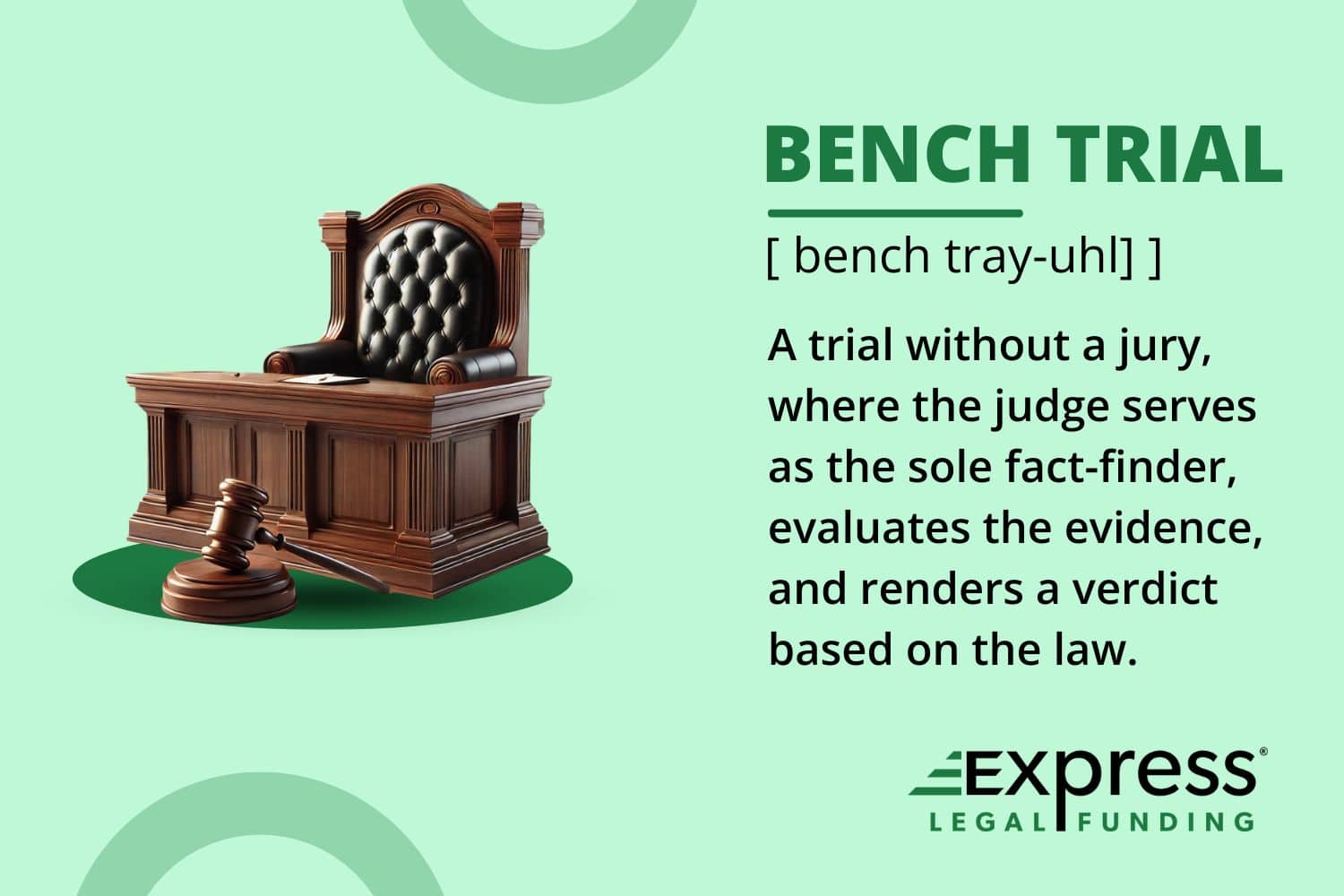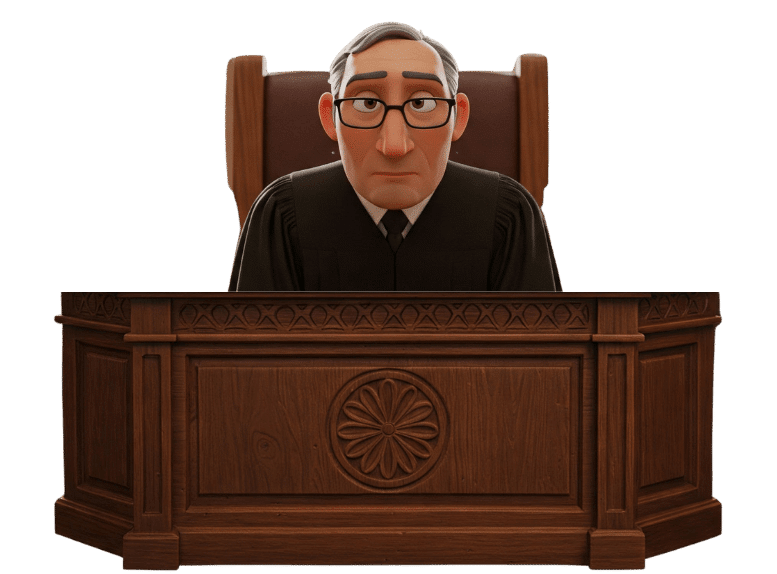A bench trial is a court proceeding in which a judge, instead of a jury, reviews the evidence and delivers the final verdict.
Understanding how bench trials work can help plaintiffs and defendants determine whether this type of trial is the right choice for their case.
What Is a Bench Trial?
A bench trial is a legal proceeding where a judge, rather than a jury, determines the outcome of a case. Unlike jury trials, which rely on a panel of citizens to assess the facts and reach a verdict, bench trials place full decision-making authority in the hands of a single judge. This type of trial is common in civil cases and certain criminal matters where both parties agree to waive their right to a jury.
Bench trials can offer a faster and more cost-effective resolution, as they eliminate the complexities of jury selection and deliberation. However, they also require careful legal strategy, as the judge acts as both the fact-finder and the interpreter of the law.
Bench trials are most commonly used in smaller court cases and legal areas. The judge that sits for the trial will often have certain expertise, depending on the nature of the trial.
How Does a Bench Trial Work?

While the specific process may vary depending on the case, a typical bench trial follows these general steps:
- Opening Statements – The trial begins with both the plaintiff and defendant (or prosecution and defense) presenting their opening statements. These statements outline their key arguments and set the stage for the evidence they will introduce.
- Presentation of Evidence – Each side presents the evidence they have gathered to support their case. This can include documents, physical exhibits, and witness testimony. Attorneys from both sides have the opportunity to question their own witnesses and cross-examine those presented by the opposing party.
- Legal Arguments and Objections – Throughout the trial, attorneys present their legal arguments, citing relevant laws and precedents. They may also raise objections to challenge the admissibility of certain evidence or statements made by the opposing side.
- Closing Arguments – After all evidence has been presented, both sides deliver their closing arguments. This final opportunity allows attorneys to reinforce their key points and persuade the judge to rule in their favor.
- Judge’s Review and Findings – The judge, acting as the sole fact-finder, carefully reviews all presented evidence, witness testimony, and legal arguments. They assess the credibility of each piece of evidence and determine the facts of the case.
- Verdict and Judgment – Based on the established facts, the judge issues a verdict, determining whether the defendant is guilty/liable or not guilty/not liable. If necessary, the judge also imposes a sentence or ruling based on their decision.
This streamlined process often results in a faster resolution than jury trials, as the judge alone evaluates the evidence and applies the law.
When Is a Bench Trial Used?
A bench trial can be used in a variety of different scenarios, but there are a few where it is most effective. The reasons for a bench trial include the following:
- Waiver of Jury Trial: In some instances, the parties can waive a trial by jury and choose a bench trial instead. An attorney may decide that this is more optimal based on the complexity and nature of the case. Additionally, a judge with expertise in law may be more beneficial than a jury of peers.
- Small Claims Court: These cases involve low monetary amounts, so it is advantageous to use a bench trial. They provide a simple and quick process to handle small-scale disputes.
- Complex Legal Matters: In cases where a complicated law is in question, it is beneficial to use a bench trial with a judge who specializes in that area. This will allow the judge to make a more informed and accurate decision than the jury would.
- Traffic Court: In most states, defendants do not have a right to a jury trial in traffic court, and traffic violation cases are handled as bench trials.
- Family Law Court: Child custody hearings, guardianship hearings, or divorce disputes.
- Bankruptcy cases: Cases involving a debtor filing bankruptcy or foreclosures must be heard as a bench trial, at which point a judge can dismiss the case with (or without) prejudice, which means the liens against the debtor will not be discharged.
- Juvenile offenses: Cases involving juvenile offenses such as truancy are bench trials.
- Some Criminal Trials: A defendant may choose a bench trial because they and their attorney believe that there is a high risk of jury bias judge will be more likely to fairly assess the presented evidence and arguments.
It is important to note that the strategy for using a bench trial can vary and that parties should consult attorneys to determine which trial is best for their situation.

How Long Does a Bench Trial Take?
The duration of a bench trial can vary based on a series of factors, including the complexity of the case, and number of witnesses, etc. However, they tend to be shorter than jury trials because it skips the jury selection process.
In simple cases, a bench trial can be over in a few hours or a day, but complex cases can take days or weeks to complete. Other factors can impact the time of a bench trial, such as the judge’s availability and the efficiency of the defense and prosecution.
With that being said, bench trials can vary in time from case to case but tend to be on the shorter side of the spectrum.
Do You Get Sentenced at a Bench Trial?
Yes, if the judge finds the defendant guilty, they can pass a sentence or make orders. Bench trials allow judges to be “the professional trier of fact” and the decision-maker for the case.
The severity of a sentence in a criminal suit will vary from case to case and based on what the laws in question allow.
Possible sentences include but are not limited to prison time, probation, and fines for criminal cases. For civil lawsuits, the order can be monetary damages or injunctions.
A sentence is based upon guidelines, statutes, and principles, which can be different depending on the case.
Once the judge announces the sentence or declares an order, it is legally binding, and everyone involved must comply with its terms.
Who Decides the Verdict in a Bench Trial?
The judge decides the verdict in a bench trial, whereas in a jury trial, the jury decides on a verdict together. Bench trials allow judges to serve as fact-finder and decision-makers.
During the trial, the judge hears the presented evidence and makes an informed decision based on the facts and relevant laws.
A judge’s decision is final unless there are grounds for an appeal. For a fair decision to be made, the judge must be impartial and apply the law objectively based on the determined facts.
How Is a Bench Trial Different From a Jury Trial?
Bench trials and jury trials are different in many ways. A few significant differences between a jury and a bench trial include the following:
- Decision Maker: In a jury trial, a group of impartial peers determines the verdict as a singular body by evaluating the evidence and assessing the law. In a bench trial, the judge serves as both the fact-finder and the decision-maker. The process is the same as when the judge evaluates the evidence and assesses the law.
- Jury Selection: Jury trials allow both sides of the case to take part in jury selection. They can question potential jurors and attempt to remove biased ones to ensure an impartial jury. In a bench trial, there is no jury. Only the judge decides the verdict.
- Jury Instructions: In a jury trial, the judge instructs the jury and guides them to apply the law in question to the evidence presented. In a bench trial, the judge does not need to instruct a jury because there is no jury. The judge alone is the decision maker.
- Deliberations: In a jury trial, the jurors deliberate in private after the evidence is presented to reach a verdict. They consider all evidence, examine witnesses, and asses the law to make an impartial decision. In a bench trial, the judge examines the evidence and assesses the law independently to reach a decision.
- Legal Arguments: Both trials have legal arguments, but they differ when it comes to who the arguments are addressed. For example, in a bench trial, the attorneys attempt to persuade the judge with evidence and law interpretation.
Can You Request a Bench Trial?
Yes, you can request a bench trial. Many times, parties have the right to request a bench trial or “waive the right to a jury trial.” The exact proceedings in this matter depend on the jurisdiction and case.
In order to request a bench trial, a formal request is provided to the court and opposing party. The court considers the request and decides whether or not to grant it.
How Much Does a Bench Trial Cost?
The total cost of a bench trial will vary from case to case. It will likely be different for the plaintiff than the defendant, and whether it is a criminal or civil suit.
Like a jury trial, the costs can include attorney fees, expert witnesses, court costs, document preparation, court reporting, and other miscellaneous costs.
The dollar amount of how much a bench trial will cost the involved parties can vary drastically.
While it may only cost a few hundred dollars for a guardianship bench trial, it could quickly cost more than $100,000 if it is a severe criminal case that requires significant preparation.
Can You Appeal a Bench Trial?
Yes, if unhappy with the outcome, a party can appeal a bench trial to a higher court. Many factors play into the process of an appeal, but the general steps are:
- Notice of Appeal: the appealing party must file a timely notice of appeal.
- Appellate Briefs: The appellant and appellee each submit an outline of their arguments that will be discussed in the appeal. These include facts and legal analysis
- Oral Arguments: Sometimes, the court may require the appellate to present their case and be questioned by appellate judges, but some cases are decided solely on written briefs.
- Appellate Decision: The appellate court reviews all of the given information and presents a decision. The options are to confirm the original court’s decision, reverse the decision, or require the case to go back to trial.
How to Win a Bench Trial?
There is no one way to win a bench trial, but due to its differences from a jury trial, it requires attorneys to identify the facts and understand the laws pertaining to the case all the more carefully.
Each case is won or lost based on the specific facts and evidence in the case, but there are some general guidelines to increase the chances of success. It is important to consider and do the following steps:
- Thoroughly Understand the Facts and Relevant Laws
- Present Strong Legal Arguments
- Gather Compelling Evidence
- Use Credible Witnesses
- Address Counterarguments
- Understand the Judge’s History and Perspective
- Apply Courtroom Etiquette

